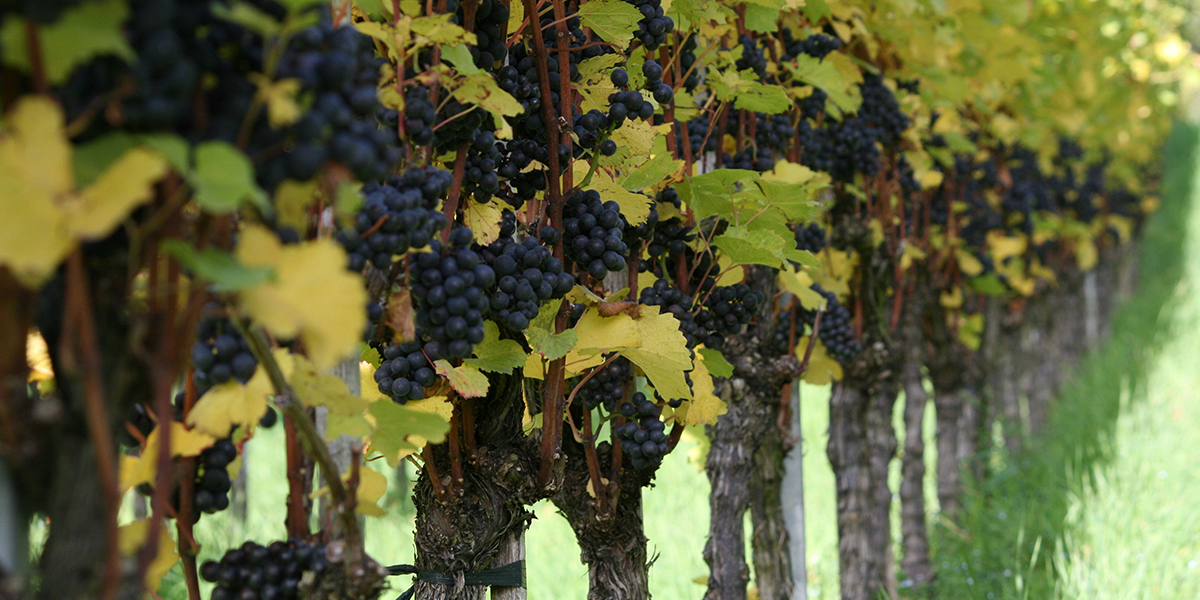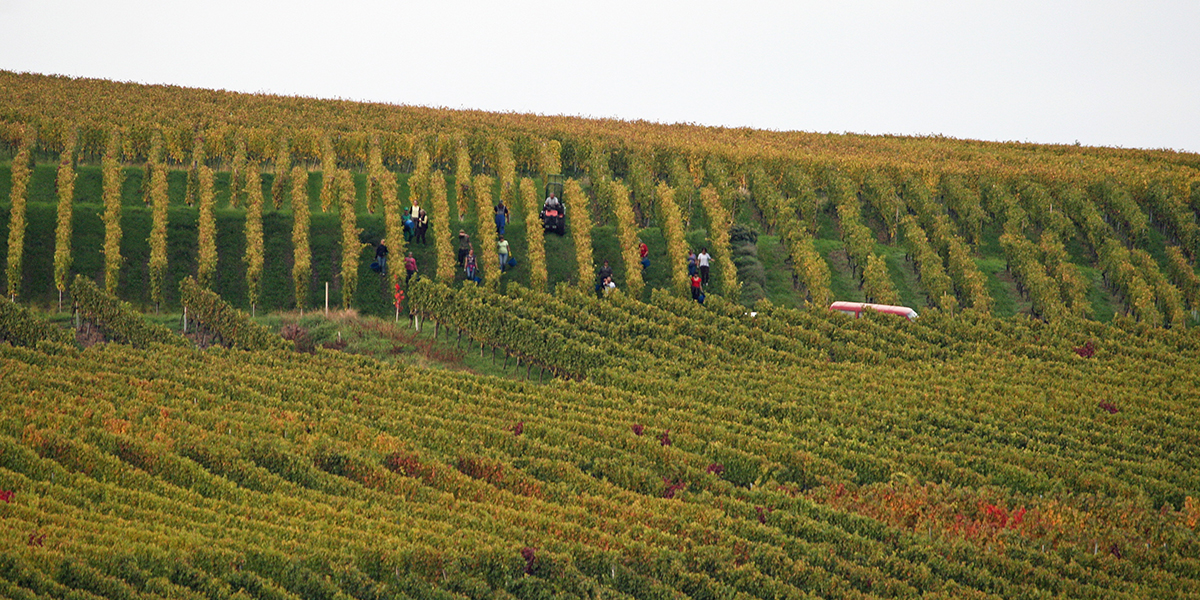It is 26 April 2016 - a holiday for many winegrowers in the Markgräflerland. The day of the Müllheim wine market, the oldest wine market in Germany. As every year, vintners from the South Baden region meet here to taste the wines of their colleagues, to talk shop, to discuss. Country winegrowers are allowed to taste here. But they are not allowed to display their wines at this time, nor are they allowed to do so at the Baden Wine Fair in Offenburg. So the four Markgräfler winegrowers Hanspeter Ziereisen, Dirk Brenneisen, Max Geitlinger and Karl-Heinz Ruser hatched a plan on the same day: "Then we'll start our own wine market. Incidentally, the inspiration for the quartet did not come over a glass of wine - but over a gin and tonic at the bar of a Müllheim country hotel.
 |
Until that day, it had been fermenting for some time among some of the winegrowers who deliberately market their wines as Landwein - i.e. in the quality level below the QbA and commonly classified as rather inferior - in order not to have to submit to the taste dictates of the quality wine test. The point of criticism is the German wine law of 1971, which many in the entire wine industry consider outdated. This is because classification as a quality wine also includes a sensory test. There, the tasters decide whether a wine has a certain regional typicity. If it does not have this, the wine may not be marketed as a quality wine. This leads to absurd realities: Highly decorated, handmade country wines with a distinct character of their own are therefore of a lower quality under wine law than the industrially produced drop for 2.99 euros from the discounter. The problem: for many wine buyers in Germany, especially those less interested, the legal classification still represents a decisive quality standard. As early as 1971, the magazine "Der Spiegel" quoted Dr. Eugen Hieke, then head of the State Chemical Testing Office in Mainz, as saying: "The new wine law is not so much 'food law' for the protection of the consumer as previous wine laws, but increasingly economic and market-regulating law.
But it is the consumer who should be the focus for Hanspeter Ziereisen, the driving force behind the Baden country wine market. Of course, proof of origin is important, and of course the wine must be marketable. But: "How it is allowed to taste should please be decided by the customer," demands the winegrower from Efringen-Kirchen.
Ziereisen, who is one of the pioneers in Germany of spontaneously fermented, gently slowly matured wines, said goodbye to the quality wine test as early as 2004 because his wines collided with the test requirements several times due to a lack of typicality. He is not alone in this; among the participants in the country wine market, Sven Enderle and Florian Moll, Sven Nieger, Dirk Brenneisen and Karl-Heinz Ruser had similar experiences. The straw that broke the camel's back and started the initiative for the Landweinmarkt was ultimately the rejections and thus the lack of marketing opportunities at regional wine events. Side note: In the meantime, regional wines have also been admitted to the Müllheim wine market...
It is 29 April 2019 - and Hanspeter Ziereisen looks a little tense for one of the rare times. In a moment, he will be welcoming guests to the third Baden Landweinmarkt. About 400 visitors, 22 participating winegrowers from Kraichgau to Markgräflerland, including a waiting list for next year, 180 wines presented - since its first edition, the Baden Country Wine Market has gained a momentum that has surprised even the initiators. Ziereisen himself puts it this way: He had not known what kind of stone he and his colleagues had thrown into the water.
This stone has been creating more and bigger waves at the latest since Jancis Robinson agreed to be the patron of the Landweinmarkt 2019. Even before that, the event had generated interest among open-minded wine lovers and experts. The fact that the Englishwoman has now succeeded in becoming the patron of this year's Landweinmarkt is both a coup and a knighthood for the Landwein vintners. At a meeting in London, Ziereisen and his wife Edeltraud "just asked" the world's most famous and influential wine journalist. And after a few weeks to think it over, Robinson's e-mail came rushing into their inbox: "I will do it".
 |
The "grande dame" of the wine world was not the only one to agree to the third edition of the Landweinmarkt: with the "Wine Advocate" critic and F.A.S. columnist Stephan Reinhardt, another renowned wine journalist took over the so-called master class at the Landweinmarkt.
With Robinson herself, the Landwein vintners were probably preaching to the choir, as she indicated in her opening speech. The "wine world is in flux like never before", the Englishwoman described her impressions. "The trend I'm observing here is a worldwide trend." There is no "one, right way" to make wine, Robinson said. But: "The most important principle there is quality, not conformity."
And she also chatted out of the sewing box, telling about Willi Klinger, the outgoing head of Österreich Wein Marketing. He invited the wine journalist to a conference - so that she could explain to the tasters there how the wine world has changed.
The Landwein vintners would like to see a similar open-mindedness from the official bodies in Germany. But until that time (maybe) comes, the participants in the Baden Landwein market put up with the often voluntary downgrading of quality - or even profit from it.
"From the very beginning, our main focus was on vinifying wines with "character", which should reflect the respective site or the respective "terroir" as unadulteratedly and directly as possible," explain Sven Enderle and Florian Moll from the eponymous winery in Ettenheim. "When our first wines were then classified as "atypical" for Baden Burgundy by responsible committees for quality wine testing, we decided to declare them as Landweine from then on so as not to have to intervene markedly in the stylistics."
"We are a very young winery and have focused exclusively on Landwein from the very beginning," say Marco Pfliehinger and Uwe Lange from the Kraichgau winery Forgeurac in contrast. "So our customers only know us that way - as a country wine producer - and so the claim of being a country wine has never really been discussed. In the meantime, new customers are also contacting us who have become aware of us precisely because of the Landwein or who find the idea very good and want to support the whole movement."
One of the many young winemakers at the Landweinmarkt is Max Geitlinger from Kandern, who receives mainly positive feedback from his customers: "You can always sense the interest in the new, the unusual, in wines that surprise, that convince and that encourage you to look into them. Landwein is the platform that allows such wines to be produced, wines that are not 'off the peg'."
Christoph Wolber and Alexander Götze from the Wasenhaus winery in Staufen also appreciate the stylistic country wine freedoms: "For us, it's about the wine and the wine we like to drink ourselves, and not about making a QbA. We present our wines rather rarely and when we do, it's usually far away, so it's nice to have a local presence as well and thus show how the less classic wine Baden can be vibrant."
And country wine veteran Ziereisen has long since dispelled initial irritations among his clientele: "In the meantime, our customers tend to understand the category "country wine" as a seal of quality for wines that are not banal and have a lot of character."
So what is it that makes the country wines presented in Müllheim's country hotel "Alte Post" different? Certainly not their qua law inferior quality. Hanspeter Ziereisen emphasises: "We may be spinners, but we are spinners with standards. We make wines with quality. Of course we sometimes have wines that fall apart, of course we sometimes dare to experiment in ways that don't please everyone. But what unites us all, as we see it, is the striving for the best possible wine - and not to find a gap because our wines would be rejected or because orange wines are hip at the moment."
Therefore, the requirements for participation are strict. The farms must have completely converted to the production of country wines. And wines entered must not come from the previous autumn. Because the philosophy also includes: "Wine needs time to become wine." In addition, winegrowers should attach importance to grapes of the highest quality. This means (at least) near-natural, elaborate and intensive (manual) work in the vineyard, as well as the greatest possible avoidance of intervention during harvesting and in the cellar.
Hanspeter Ziereisen is also aware that this is not to everyone's taste and liking: "Our wines often do not correspond to modern tastes. They tend to be more mineral than fruity."
Thus, at the third Baden Land Wine Market, there was not only a lot of appreciation (of course) but also criticism for the wines. A circumstance that, of course, does not please the participating vintners, but which they appreciate. Because the feedback from the mostly very knowledgeable visitors is a helpful incentive, especially for the younger winemakers. Frequently, the guests' opinions and questions also provided a welcome opportunity to engage in lively discussions with the winemakers.
Nevertheless, many visitors agreed on one thing: with almost all participating winemakers, they recognised their own signature and character in the collection. And the liveliness during the event reflected the feeling of winemakers and guests: something is on the move here. Or as Marco Pfliehinger and Uwe Lange from the Forgeurac winery commented: "You can really be curious about what else is going to happen there."
Dirk Brenneisen, Mario Burkhart, Enderle & Moll, Fendt Weinfamilie, Weingut Forgeurac, Frank Weinbau, Max Geitlinger, Weingut Greiner, Weingut Höfflin, Johannes Kiefer, Michael Kintz, Liebich Winery, Linder Winery, Sven Nieger, Hannes Pix, Ralf Röschard, Karl-Heinz Ruser, Rabenhof Winery, Felix Scherer, Vorgrimmler Winery, Wasenhaus Winery, Hanspeter Ziereisen
Hartmut Bick is a journalist and trained winemaker. He has been associated with the Ziereisen winery for years in various functions and is also a member of the team of helpers for the Badischer Landweinmarkt.
We invited all participants of the Landweinmarkt to submit samples. Unfortunately, not all businesses accepted our invitation, so that we can only present some producers without wines so far. We present the best results from our tastings here. Links to all the wines tasted so far with detailed descriptions can be found via the wineries linked below the article. As always, the tastings were conducted blind by Marcus Hofschuster in Erlangen.